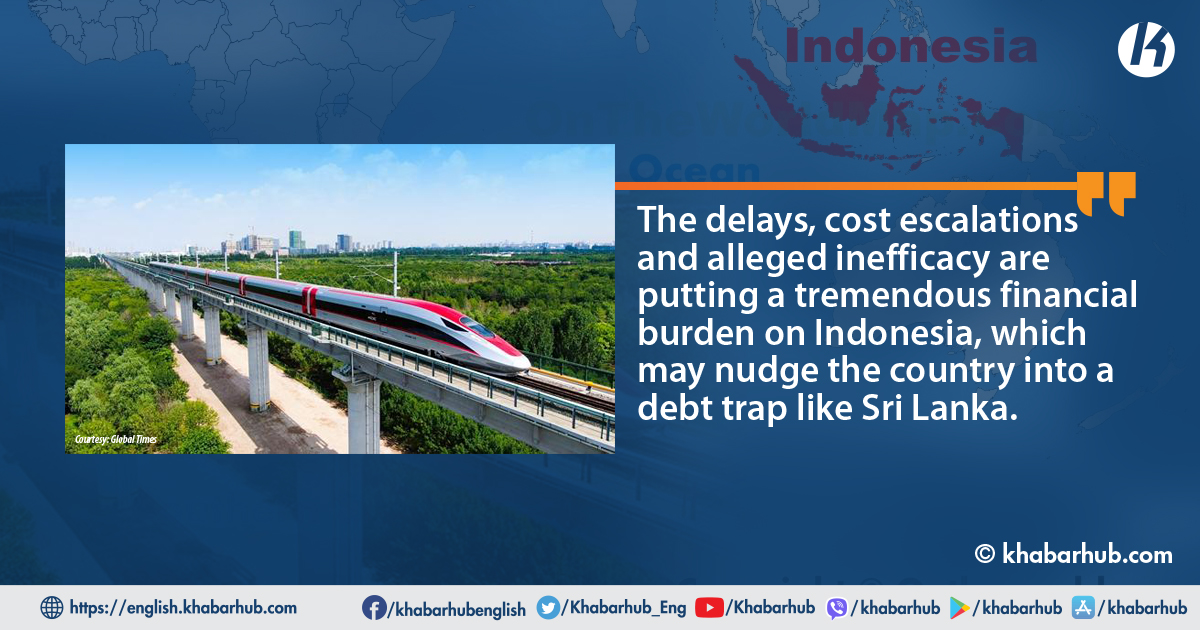0%

Indonesian President Joko Widodo’s ambitious plans to flag off the country’s first high-speed railway in November 2022 in the presence of major world leaders during the G20 summit remained on paper.
The reason was Chinese-funded project failed to meet the deadline. It has run into delays.
Now there is uncertainty if the rail project would be able to begin in 2023.
The delays, cost escalations and alleged inefficacy are putting a tremendous financial burden on Indonesia, which may nudge the country into a debt trap like Sri Lanka.
The 142-km high-speed rail line from the capital city of Jakarta to Bandung is a part of the much-touted BRI. China has portrayed BRI as a megaproject that would boost infrastructure building and connect the major global centers.
However, many BRI projects in different parts of the world including in Indonesia are facing challenges.
The participant countries are facing financial problems. The non-functional BRI projects have led to revenue loss while the unexpected cost overruns due to delays have added to financial problems.
The strong criticism led the project proponent Indonesia-China High-Speed Train (KCIC) consortium to announce that the rail line would be operational in mid-August.
The Indonesian rail project was supposed to be ready in 2019. However, the implementation of the crucial BRI project was affected due to poor planning and implantation activities such as hiring underqualified contractors, damages to houses during the blasting process, fatal accidents, besides high-cost overruns.
Many houses were damaged or collapsed during rail line construction work. Yeni Yuliati from West Java province said: “My house collapsed and almost fell on my children. I feel unsafe with the new house since our land [is located] too close to the tunnel.”
There have been negative environmental and social impacts of the China-funded rail line.
Meiki W Paendong of NGO WALHI West Java said the rail project hurt local livelihoods and violated at least six Indonesian laws.
“Project developers blatantly ignored major red flags related to the project’s design, sustainability, and legal compliance,” she said.
Even the Indonesian Public Works Ministry picked holes in the rail line development by the Chinese contractor.
Faisal Basri, Economist at the University of Indonesia, had flagged the funding for the rail project.
“We all know that working with China has many ‘under tables. Don’t expect to be clean if you still cooperate with China,” he said.
The delay of four years for the Jakarta-Bandung rail line has become a big embarrassment for the ruling government and tainted China’s credibility to develop and deliver big projects, said Teuku Rezasyah, an international relations analyst at Bandung-based Padjadjaran University.
“A further delay will only become ammunition for the opposition to attack,” he said.
The project cost has escalated by 40 percent. The cost overruns have touched the USD 1.49 billion figure.
Moreover, the Chinese contractors are seeking an addition of 30 years to its 50-year concession of the rail project.
This would mean China would have control over the rail project until the early 22nd century, thus igniting fear of a debt-trap.
There has been constant and intense criticism of the delayed rail project and its financial liabilities.
The Indonesian government has to make statements frequently that the country would not fall into a debt trap due to Chinese BRI investment.
The nondisclosure of BRI project agreements is adding to the concerns and anger among people of Southeast Asia’s largest economy.
“There is a risk that the target of commercial operations in August could be delayed to complete all construction by December 31,” reads the report.
Analysts and newspapers expressed concerns that Indonesia was inching closer to a debt trap.
They had warned of a possible debt trap when the project was signed in 2016.
“Now China is insisting to convert the overrun cost into the government with ridiculously high-interest rates. This is too scandalous for us to ignore,” Jakarta Post quoted a senior government observer as saying.
The strong criticism led the project proponent Indonesia-China High-Speed Train (KCIC) consortium to announce that the rail line would be operational in mid-August.
“By September and October, the train will operate normally. We wait for the transition period according to regulations,” said Emir Monti, the spokesman for the Chinese contractors-led KCIC consortium.
However, an internal report prepared by the Indonesian Transport Ministry and three independent consultants revealed that the KCIC claims were unrealistic and misleading, as too many unfinished tasks were yet to be completed.
And the rail line could only be started in 2024.
“There is a risk that the target of commercial operations in August could be delayed to complete all construction by December 31,” reads the report.